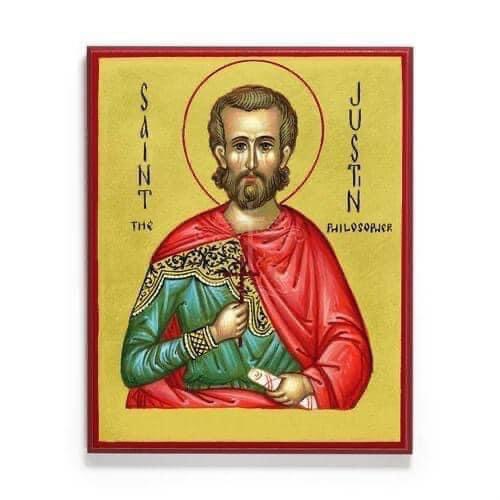
Today the church remembers one of its most influential early thinkers: St. Justin, Martyr, Apologist, and Philosopher.
As the early church began to expand and grow, the Second Century proved to be a difficult time period for those trying to be honest about following the faith in a world hostile to non-conformity.
St. Justin, probably the most influential public Christian figure of his day, was born to pagan Greek parents in Samaria around the year 100 A.D. He sought out the best thinkers of the time in his honest pursuit of philosophy and to understand religion, and while studying in Ephesus stumbled upon the stories of Christian martyrs. He was amazed that people would die for their faith, noting that “no one believes in Socrates to the point of dying for what he taught…” (though, truthfully, the Inquisition would turn this notion on its head, right?).
As the story goes, he came upon an elder Christian by the seashore who explained to him the prophets of the Hebrew Scriptures, and then and there he decided to become a Christian.
St. Justin taught the faith in Ephesus for a while, and eventually made his way to Rome where he made two famous defenses of Christianity: once to emperor Antoninus Pius, and once to the assembled Roman Senate.
He became embroiled in a series of debates with the Cynic philosopher Crescens, and though St. Justin provided honest and tight philosophical defenses, it went…well…predictably for him.
When push came to shove, St. Justin refused to make burnt sacrifices to the emperor, and for that he and some of his students were killed.
His Apologies still remains a sound defense of the faith and an early glimpse at what ancient Christians believed and practiced. St. Justin was also keen to make sure that Christianity didn’t ignore the Hebrew Scriptures (which some strains are wont to do), and kept the faith rooted in the prophecies of old.
Most importantly (at least, for me), St. Justin didn’t see Christianity as a foil for Platonism or as incompatible with deep philosophy. Rather, he saw it as both complementary and, in some ways, a culmination of the life of the mind.
St. Justin a reminder to me, and should be for the whole church, that the faith doesn’t mean a rejection of the life of the mind.
-historical bits from Pfatteicher’s _New Book of Festivals & Commemorations)
-Icon written by the saints at Legacy Icons (legacyicons.com)
